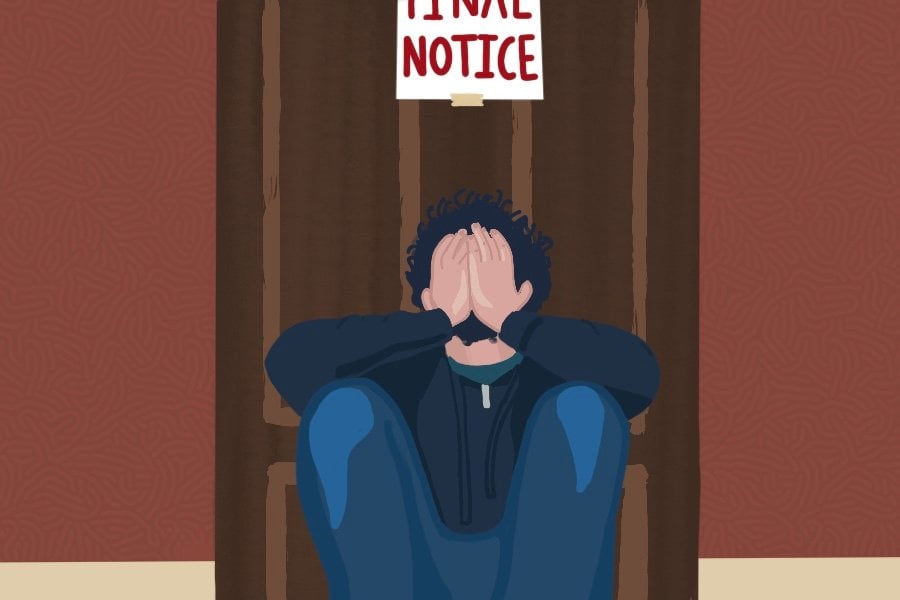Q&A: Housing, Counseling and Education Director Jasemen Hatcher talks Cook County’s Emergency Rental Assistance Program
Illustration by Catherine Buchaniec
In response to the financial impact of the COVID-19 pandemic, Open Communities will help residents register for up to 15 months of county-subsidized rent relief, plus utility relief, until April 2.
March 26, 2021
Suburban Cook County residents can apply for rent relief aid until April 2 under Cook County’s Emergency Rental Assistance Program. Through the program, some landlords and tenants are eligible to receive up to $15,000 per household. The funds, disbursed directly to landlords, can be used to forgive up to twelve months’ missed rent, three months’ future rent and assistance with bills for at least one household utility.
Who is eligible: The program is only open to suburban Cook County residents. Eligibility is based on Area Median Income level, which uses income, household size and average local salary to determine if a household qualifies for subsidized rent. Residents can check their eligibility here.
How to apply: Applicants need to provide one form of identification, such as a drivers’ license, as well as a Social Security card if they have one and a document listing household income and a copy of the applicant’s utility bills. Cook County also requires documented proof that COVID-19 has negatively impacted the applicant’s financial status. Approved forms of proof include medical bills, tax forms prior to March 2020 and unemployment claims filed after March 2020. Applicants should upload required documents to the online application portal.
Those without internet access can call county partner Open Communities, a fair housing nonprofit serving Chicago’s north and northwest suburbs. A representative will complete the application for them over the phone. Both tenants and landlords must fill out an ERA application to receive aid.
In an interview with The Daily, Jasemen Hatcher, the organization’s director of housing, counseling and education, explained the program’s planned impact. This interview has been lightly edited for brevity and clarity.
The Daily: What are the goals of the Emergency Rental Assistance program, and where does funding go?
Hatcher: The program’s goal is to assist tenants who are behind on rent, mainly those who suffered some type of financial change March of last year. A lot of our families in our service area have either lost jobs or taken in more family members who have lost jobs. There’s been a lot that impacted our community’s ability to pay their rent, and that is impacting landlords who may have mortgages and are facing foreclosures.
The Daily: Are you guaranteed to receive aid if you apply to the ERA program?
Hatcher: Right now, we’re not turning anyone away, as long they have that financial emergency that has happened since March. We leave it up to the other community partner to determine eligibility. Maybe a particular person doesn’t meet the first round, but there’s another tier that they’ll go in.
The Daily: In addition to helping residents with the application process, Open Communities offers mediation between landlords and tenants in households with missed rental payments. How does mediation help?
Hatcher: As tenants became overwhelmed by their finances and there weren’t a tremendous number of programs, they weren’t able to pay the landlords… There were a lot of harsh words used, threats, things of that nature. Speaking to landlords and tenants as a neutral mediator became a lifeline.
The Daily: How do you expect Open Community’s client base for ERA applications to compare to previous rent relief programs?
Hatcher: We expect to receive at least 50 percent of those who called a year ago asking for assistance back again. The economy in our area has not greatly improved for those who are already at risk. There are going to be a lot of people, even if they were able to receive some type of funding at some point a year ago, they’re going to need help now.
The Daily: What do you hope the ultimate impact of the ERA will be?
Hatcher: I always hope that the maximum number of households will receive aid. But I also hope that this gives the community a sense of hope. Spring was always that time, pre-pandemic, we started to see a little increase in evictions. This program is timely to potentially save people from going down that path.
Email: [email protected]
Related Stories:
— City to consider altered agreement with Open Communities after resident complaints
— Aldermanic candidates discuss racial inequity, affordable housing in open forum


